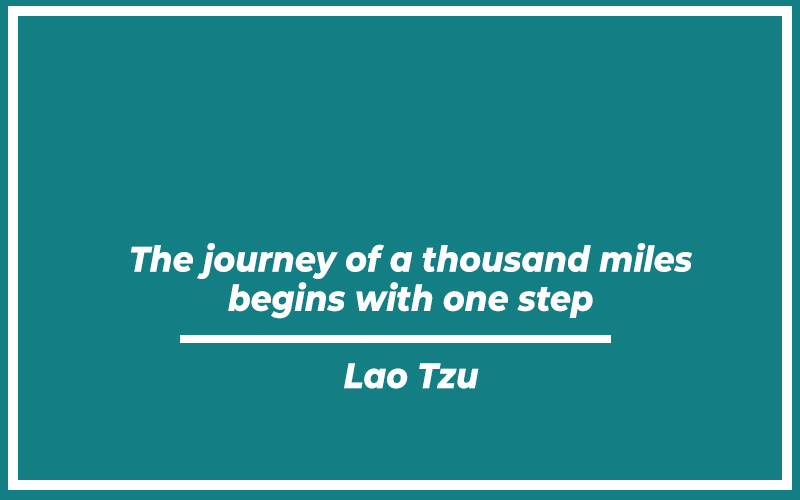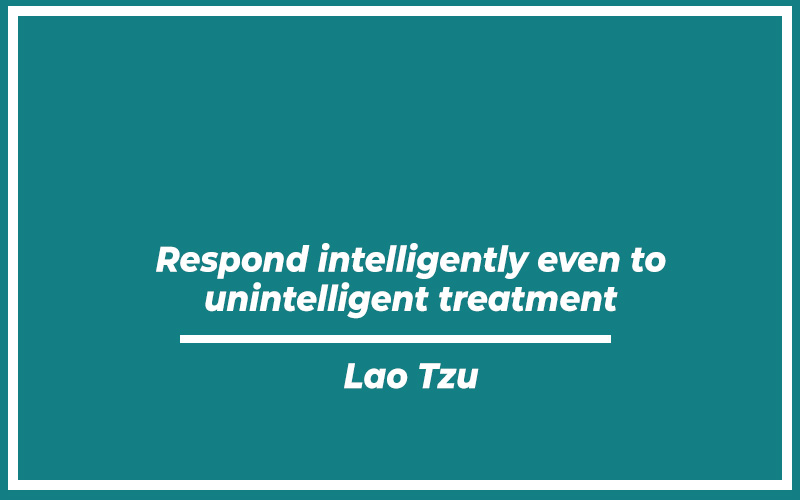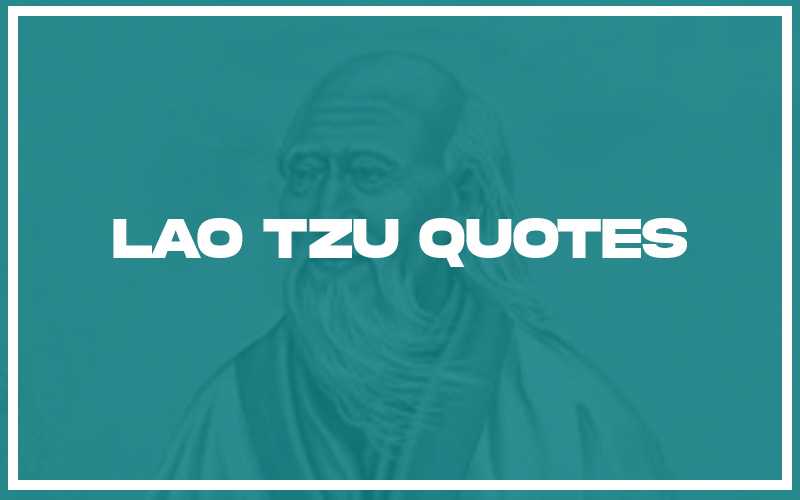Lao Tzu, an ancient Chinese philosopher and writer, started Taoism and wrote the famous book “Tao Te Ching.” His quotes are simple but profound, giving valuable wisdom about life, nature, and what it means to be human.
They encourage you to seek balance, live simply, and connect with the world around you. Whether you need advice or a fresh perspective, Lao Tzu’s words offer valuable insights that are still relevant today.
Lao Tzu Quotes

“The journey of a thousand miles begins with one step.” – Lao Tzu
This quote emphasizes the significance of taking the first step, no matter how daunting a task may appear. Lao Tzu suggests that even the longest and most complex journeys are achievable by simply starting with one small step.
It serves as a powerful reminder not to be overwhelmed by the magnitude of a goal but to focus on the initial, manageable action. This approach encourages persistence and gradual progress, showing that all great achievements start with a single, determined effort.
Also Read: Jay Shetty Quotes (with Explanation)
“Knowing others is intelligence; knowing yourself is true wisdom. Mastering others is strength; mastering yourself is true power.” – Lao Tzu
Lao Tzu distinguishes between superficial knowledge and profound wisdom. Understanding others is a form of intelligence, but true wisdom lies in self-awareness. Mastering others may demonstrate strength, but mastering oneself reveals genuine power.
This quote encourages introspection and self-control, suggesting that true strength comes from within, through self-mastery and understanding one’s own nature. It underscores the importance of inner growth and the transformative power of knowing and controlling oneself, rather than exerting power over others.
“When I let go of what I am, I become what I might be.” – Lao Tzu
This thought-provoking statement by Lao Tzu highlights the transformative potential of letting go of our current identities and limitations. By relinquishing attachments to who we think we are, we open ourselves to becoming our true selves and realizing our full potential.
It suggests that growth and transformation occur when we are willing to embrace change and uncertainty, shedding the old to make room for new possibilities. This process is crucial for personal development and achieving what we are truly capable of becoming.
“A leader is best when people barely know he exists, when his work is done, his aim fulfilled, they will say: we did it ourselves.” – Lao Tzu
Lao Tzu advocates for a leadership style that empowers others. He believes the most effective leaders are those who work behind the scenes, allowing their followers to feel a sense of ownership and accomplishment.
This approach fosters independence and self-reliance, making people feel that they have achieved their goals on their own. By leading with humility and minimal interference, a true leader inspires others to thrive, creating a legacy of self-sufficient and capable individuals who believe in their own potential.
“Nature does not hurry, yet everything is accomplished.” – Lao Tzu
This quote highlights the effortless efficiency of nature, serving as a model for human behavior. Lao Tzu suggests that patience and allowing things to unfold naturally lead to successful outcomes. By not forcing or rushing, nature accomplishes its goals with grace and precision.
This teaching encourages us to adopt a similar approach in our lives, trusting in the natural flow of events and embracing patience. It reminds us that sometimes, the most effective way to achieve our goals is to let things happen in their own time.
“He who knows does not speak. He who speaks does not know.” – Lao Tzu
Lao Tzu critiques the notion of wisdom being displayed through speech, suggesting that true knowledge often remains unspoken. Those who genuinely understand something tend to speak less, while those who talk a lot may lack true insight.
This quote promotes the value of quiet contemplation and the power of silence. It encourages us to listen more and speak less, highlighting that profound wisdom is often demonstrated through actions and silent understanding rather than verbal expressions.
“If you do not change direction, you may end up where you are heading.” – Lao Tzu
Lao Tzu warns against the dangers of complacency and the importance of making conscious changes in our lives. Without altering our course, we risk arriving at an undesired destination.
This quote urges us to periodically evaluate our paths and make necessary adjustments to ensure we are moving towards our true goals. It serves as a reminder to stay mindful and proactive, avoiding the pitfalls of routine and inertia, and to take deliberate steps to steer our lives in the direction we truly wish to go.
“To lead people, walk behind them.” – Lao Tzu
Lao Tzu offers a unique perspective on leadership that emphasizes humility and service rather than control and dominance. By suggesting that a leader should walk behind their people, he advocates for a supportive role that empowers individuals rather than leading from the front.
This approach ensures that the leader remains attentive to the needs of others and fosters a sense of community and equality. It’s a lesson in leading by example and putting the needs of the group ahead of one’s own ambitions.
“He who is contented is rich.” – Lao Tzu
This quote challenges the conventional view of wealth, suggesting that true richness comes from contentment rather than material accumulation. Lao Tzu proposes that those who find satisfaction in what they have are genuinely wealthy, regardless of their economic status.
This wisdom encourages a shift from the relentless pursuit of more towards appreciating the present moment and what we currently possess. It’s a call to cultivate gratitude and find joy in simplicity, which can lead to a more fulfilling and peaceful life.
“Act without expectation.” – Lao Tzu
Lao Tzu teaches the importance of taking action motivated not by the desire for a specific outcome but by the intrinsic value of the action itself. This principle helps to cultivate a mindset free from the disappointment that often follows unmet expectations.
By acting without anticipation of reward or acknowledgment, one can maintain focus on the quality and integrity of the task at hand. This approach fosters purity in our actions and a serene acceptance of whatever results may come.
“Being deeply loved by someone gives you strength, while loving someone deeply gives you courage.” – Lao Tzu
In this profound observation, Lao Tzu highlights the dual powers of love: the strength we gain from being loved and the courage we find in loving others.
This quote reflects on the transformative impact of love, which not only supports us but also emboldens us. It underscores the importance of emotional bonds and mutual support, suggesting that love is not just a feeling but a source of fundamental human virtues.
“A good traveler has no fixed plans, and is not intent on arriving.” – Lao Tzu
Lao Tzu here speaks to the virtue of flexibility and openness during one’s journey through life. He suggests that being a good traveler involves an openness to experience and an acceptance of change, rather than a rigid adherence to predetermined plans.
This philosophy encourages embracing the journey itself as the destination, finding value and lessons in the unexpected, and being present in each moment without being overly focused on the endpoint.
“Music in the soul can be heard by the universe.” – Lao Tzu
This quote captures the ethereal connection between the individual’s inner experiences and the cosmos. Lao Tzu suggests that our deepest feelings and expressions, when genuine and profound, resonate beyond our own existence to touch a universal chord.
It’s an invitation to recognize and nurture the spiritual aspects of our experiences, appreciating how our innermost expressions of joy, creativity, and sorrow are connected to the larger tapestry of life.

“Respond intelligently even to unintelligent treatment.” – Lao Tzu
Lao Tzu advises maintaining composure and thoughtfulness, even in the face of ignorance or ill-will. This quote encourages us to rise above provocation and respond with wisdom and patience.
It is a call to practice self-control and discretion, aiming to bring clarity and understanding rather than reacting in kind. This approach not only preserves one’s peace of mind but can also transform challenging interactions into opportunities for growth and reflection.
“Simplicity, patience, compassion. These three are your greatest treasures.” – Lao Tzu
Lao Tzu identifies simplicity, patience, and compassion as foundational virtues that enrich our lives. By embracing simplicity, we reduce unnecessary complications, fostering clarity and peace. Patience allows us to endure hardships with grace, making it easier to navigate life’s challenges.
Compassion connects us to others through kindness and empathy, enhancing our relationships. Together, these virtues form a treasure trove that once cultivated, leads to a more fulfilling, peaceful, and interconnected existence.
“If you realize that all things change, there is nothing you will try to hold on to.” – Lao Tzu
This quote reflects on the transient nature of existence and the futility of clinging to material or temporary aspects of life. By understanding and accepting that everything changes, we can live with greater freedom and less fear.
Lao Tzu encourages us to embrace the flow of life, letting go of our attachments, which often bring anxiety and suffering. This wisdom helps us to focus on the present and find peace in the inevitability of change.
“The soft overcomes the hard; the gentle overcomes the rigid.” – Lao Tzu
Lao Tzu here contrasts the qualities of softness and gentleness against hardness and rigidity, suggesting that in many cases, a softer approach is more effective.
This concept can be applied to personal interactions and methods of problem-solving, where flexibility and understanding can achieve more than force and insistence. It encourages us to reconsider how strength is defined and to value the resilience that gentleness and adaptability bring.
“True words are not beautiful; beautiful words are not true.” – Lao Tzu
This quote warns against equating eloquence with truthfulness. Lao Tzu suggests that words that aim to be beautiful or pleasing might not necessarily convey the truth, while truthful statements may often lack aesthetic appeal.
It serves as a reminder to value substance over style and to seek authenticity in communication rather than being swayed by rhetoric or charm.
“When you are content to be simply yourself and don’t compare or compete, everybody will respect you.” – Lao Tzu
Here, Lao Tzu emphasizes the importance of self-acceptance and the avoidance of constant comparison or competition. By being content with oneself, one projects a confidence and peace that earns respect from others.
This quote encourages us to focus on personal growth and self-awareness, fostering genuine self-esteem that is not dependent on external validation.
“Mastering others is strength. Mastering yourself is true power.” – Lao Tzu
Lao Tzu makes a distinction between external control over others and internal control over oneself. While it may show strength to have influence over others, true power is demonstrated through self-mastery.
This includes discipline, emotional intelligence, and the ability to navigate one’s own impulses and desires. The quote urges us to invest in understanding and controlling our own actions and reactions as the path to genuine autonomy and effectiveness.
“The flame that burns Twice as bright burns half as long.” – Lao Tzu
This metaphor highlights the consequences of intense but unsustainable efforts. Lao Tzu points out that just as a brightly burning flame uses up its fuel quickly, so too can excessive intensity in work or relationships lead to burnout.
It serves as a cautionary reminder about the importance of balance and sustainability in our actions and passions, suggesting that moderation can lead to greater longevity and fulfillment.
“Great acts are made up of small deeds.” – Lao Tzu
Lao Tzu emphasizes that significant achievements are often the cumulative result of small, consistent actions. This quote encourages us not to underestimate the power of minor, seemingly insignificant steps; they are the building blocks of grand accomplishments.
It teaches persistence and attention to the small details, fostering a mindset that appreciates gradual progress and the importance of each contribution, no matter how minor it may appear.
“To see things in the seed, that is genius.” – Lao Tzu
This quote highlights the wisdom of recognizing potential in its most nascent stage. Lao Tzu calls this ability “genius,” reflecting on the foresight needed to envision what something small and unassuming can become over time.
It encourages us to look beyond the present state of things, to anticipate future possibilities, and to nurture growth. This perspective is valuable for innovation, leadership, and personal development, where the ability to see beyond the immediate is crucial.
“He who conquers others is strong; he who conquers himself is mighty.” – Lao Tzu
Lao Tzu points out the greater challenge and reward in conquering oneself compared to overcoming external adversaries.
Self-conquest—mastering one’s impulses, emotions, and thoughts—is portrayed as a mightier achievement than dominating others. This philosophy promotes internal strength and discipline as the true markers of power and success, encouraging a journey towards self-awareness and self-regulation.
“Water is fluid, soft, and yielding but will wear away rock, which is rigid and cannot yield.” – Lao Tzu
In this metaphor, Lao Tzu illustrates the strength of adaptability and persistence. Water, though soft and yielding, can erode hard rock over time.
It symbolizes the power of gentleness and the effectiveness of persistence and flexibility over brute force or rigidity. This teaches us the value of a patient and adaptable approach to life’s challenges, rather than a forceful or rigid stance.
“The best fighter is never angry.” – Lao Tzu
Lao Tzu suggests that true mastery in conflict involves maintaining composure and not succumbing to anger. This quote teaches that effective conflict resolution is not about aggression or overpowering others, but about staying calm and focused.
Anger often clouds judgment and leads to poor decision-making, while calmness allows for clear thinking and strategic planning, which are crucial in any confrontation or challenge.
“Success is as dangerous as failure. Hope is as hollow as fear.” – Lao Tzu
Here, Lao Tzu offers a caution against extreme emotions and states, whether positive or negative. By comparing success with failure and hope with fear, he implies that becoming overly attached to outcomes—whether desired or dreaded—can lead to instability and disappointment.
This quote advocates for equilibrium and finding balance, suggesting that a moderated, centered approach to life’s ups and downs is healthiest.

“The Tao that can be told is not the eternal Tao.” – Lao Tzu
This foundational statement from the Tao Te Ching expresses the ineffable nature of the Tao, the underlying principle of the universe according to Taoism.
It suggests that true understanding of the Tao is beyond verbal explanation and must be experienced directly. This quote challenges us to seek deeper, experiential knowledge rather than relying solely on intellectual understanding, promoting a spiritual exploration that transcends words.
Final Thoughts
In summary, Lao Tzu’s quotes provide simple yet profound advice for living a happy life. He encourages you to stay humble, go with the flow, and appreciate the simple things around you.
By following his wisdom, you can find inner peace and balance. His words remind you that true strength comes from being flexible, and real wisdom is knowing when to let things be.

